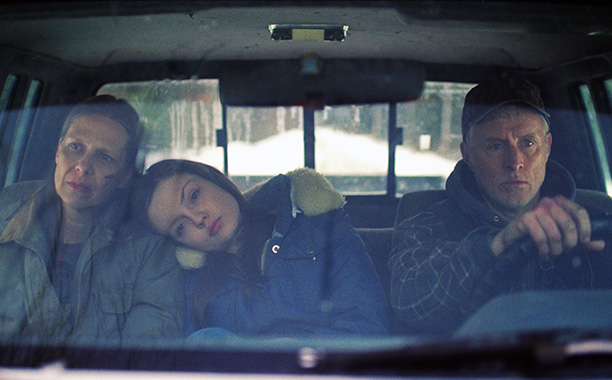Bluebird
USA, 2013
Written and Directed by Lance Edmands
It is an instinctual response to want to assign fault after a horrible accident. It takes concentrated and open-minded reflection to achieve a fair evaluation of tragedy, and Bluebird opens the door to thoughtful deliberation in its treatment of complicated moral issues with nuanced simplicity. This is a film of moods and feelings, not generalizations or judgments. The setting transports us to a little Maine town, where the primary industry is logging. Winter has cast its gloomy pall over everything and created a deceptive sense of stasis.
But Bluebird is actually a story about what happens when things are set in motion and there’s no taking them back or controlling the consequences. The action is ignited by inaction, or more accurately by neglect. When Lesley (Amy Morton), a local school bus driver, gets distracted by a lost bluebird that strays into her vehicle, this anomaly clearly stirs something in her, though what exactly that is the screenwriter leaves to our imaginations. Presumably, Lesley leaves off her duty in a daze and neglects to finish her end-of-the-day inspection. As a result, a little boy asleep in the back of the bus ends up trapped in the subzero temperatures over night, and he succumbs to hypothermic shock and slips into a coma.
The idea of neglect resonates throughout the story, manifesting in various characters differently. Lesley’s neglect isn’t the only one that made this tragic event possible. The little boy’s mother, Marla (Louisa Krause), forgets that it’s her day to pick him up from school, and the reasons for her neglect are less esoteric and more selfish than Lesley’s. John Slattery’s character, Richard, has also been neglectful of his family lately. His long absences have not gone unnoticed by his wife or his daughter, who has started to indulge in risky behavior to impress a boy at school and perhaps satisfy a yearning for attention that is not fulfilled at home. The boy in question could probably also benefit from a little more parental supervision.
The appearance of a bluebird seems like a pretty simple happenstance at first until you start to consider that it is the dead of winter and it should have migrated to warmer climates by now. All the occurrences of the narrative follow this design. While the story unfolds plainly and without commentary, conclusions won’t be reached easily unless all factors receive equal and unbiased consideration. Thankfully, the script refrains from artful monologues and philosophical ponderings. Only on a couple occasions does the soundtrack spoil scenes that might have played better in silence with its overbearing emphasis. Otherwise, music generally compliments the mood with atmospheric undertones without manipulating the emotional integrity of the performances.
This film derives the bulk of its impact from a host of powerful performances, which in turn benefit from the simplicity of the storytelling approach. Amy Morton, most renowned for her theatre work, shoulders a greater share of the dramatic weight, and she communicates Lesley’s guilt with an expert command of poise and countenance. Louisa Krause balances the many unsympathetic qualities of her character with a somewhat redeeming vulnerability, and John Slatterly trades in the now iconic cockiness of his Mad Men role to adeptly play the less communicative part of a downtrodden man unable deflect his mental anguish with the perfect wisecrack. Margo Martindale, playing the victim’s grandmother, most frequently voices the script’s recriminations, but she avoids vitriol in favor of a conscientious performance, loaded with disappointment, overwhelming grief, and self-doubt.
Lance Edmands, the film’s writer and director, builds his story around the ripple effect of what seems like an isolated event at first glance to make a statement about the interconnectedness of life. That’s well-trodden territory for independent cinema, but this film tackles themes of the need for personal connection and the devastating effects that result from the lack of it. Edmands treats us with a catalogue of symbols representing isolation: an abandoned child, a neglected wife, an overburdened husband determined to hide his anxieties from his family, an immature teenager struggling to understand her growing independence, a failing business cut off from its usual sources of revenue, and of course, the metaphor that started everything, a lone bluebird missing its flock.
A story like this one could have very easily gotten lost in heavy-handedness, but Edmands’ take envisions a refreshingly understated morality play while honoring the complexity of the situation. His use of imagery is straightforward but haunting. His scenarios are honest and open-ended. The result is a refined, provocative narrative full of intricacies that inspire contemplation.
-Kenneth Broadway
The Tribeca Film Festival runs April 17-28. Visit the official website for more information.



